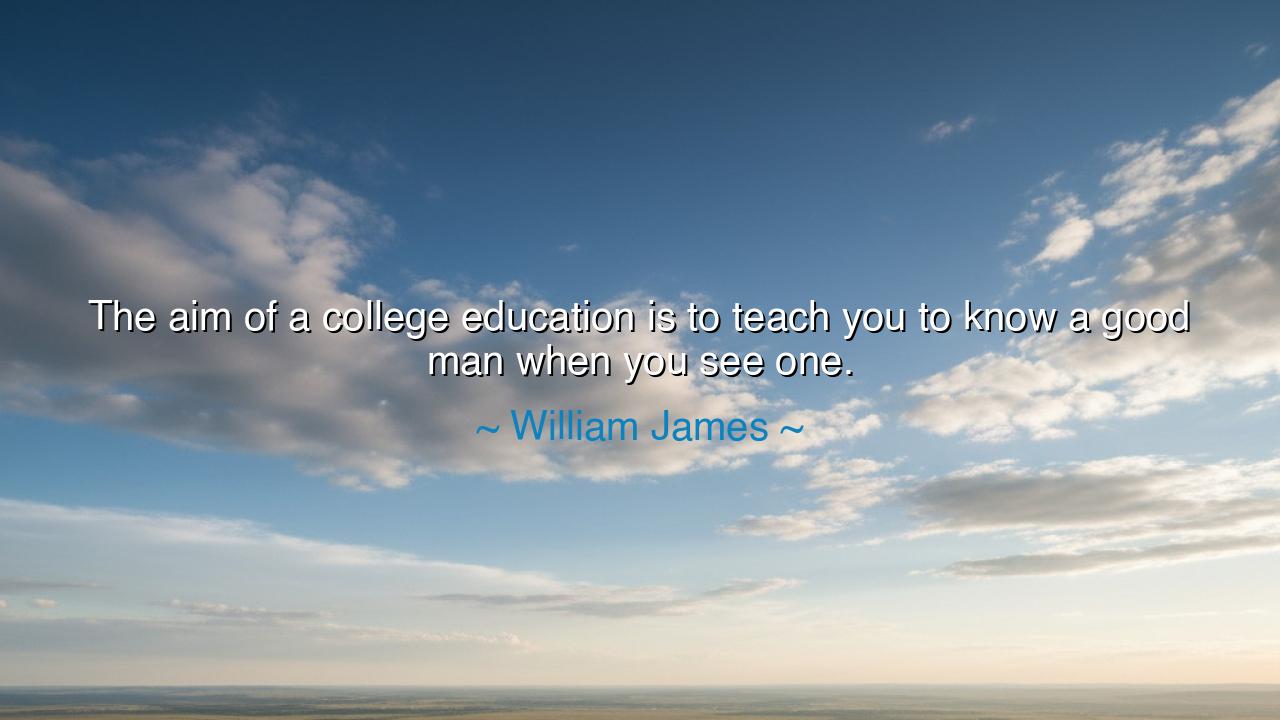
The aim of a college education is to teach you to know a good man






The philosopher William James, father of American psychology and brother to the novelist Henry James, once said: “The aim of a college education is to teach you to know a good man when you see one.” These words pierce through the illusions of modern learning like a shaft of light through fog. For in an age that measures success by wealth, title, and intellect, James reminds us of something older, purer, and far more enduring — that the truest purpose of education is not the accumulation of facts, but the cultivation of discernment. To “know a good man” is not simply to recognize virtue in others, but to understand goodness itself — to perceive truth, integrity, and character wherever they appear.
William James, whose life bridged the scientific and the spiritual, believed that learning without morality is empty, and intellect without compassion is dangerous. His words arose in a time when universities were rapidly modernizing, focusing on specialized training and the pursuit of technical knowledge. Against this tide, James called his students to remember the soul of learning — that the purpose of college is not to create clever minds, but wise hearts. A truly educated person, he taught, is not one who can merely argue or analyze, but one who can recognize greatness of spirit, wherever it shines. For knowledge without moral vision is like a lamp without a flame.
The ancients knew this truth well. In Plato’s Republic, the philosopher-king is not the one who knows the most, but the one who loves the good most deeply. Education, for Plato, was the art of turning the soul toward the light, so that one could recognize virtue as surely as the eye recognizes the sun. James’s quote is the echo of that same ancient wisdom: that learning must awaken moral perception — the ability to see beyond the surface of people and events to the essence of what is just, noble, and true. The goal is not to fill the mind, but to refine the heart, to make the student capable of judgment that honors truth over appearance.
Consider the story of Abraham Lincoln, who had little formal schooling, yet became one of the wisest leaders in human history. His education came not from universities, but from observation, reflection, and the discipline of conscience. When the nation was torn by civil war, Lincoln’s greatness lay not in his knowledge of law or politics alone, but in his ability to discern goodness — to see the humanity even in his enemies, to surround himself with capable and virtuous men, and to judge not by pride but by principle. He was, in the truest sense, an educated man, because he could recognize the good and act in harmony with it.
James’s insight also reminds us of the difference between information and wisdom. A person may graduate with honors and still be blind to goodness. The proud may recite moral theories yet fail to recognize honesty in a humble soul. But the truly educated eye — the one refined through reflection, humility, and empathy — can look upon another and see truth shining there. That is the power of genuine learning: it purifies perception, enabling one to see the moral architecture of the world. To “know a good man” is to see clearly through illusion, pretense, and self-interest, and to know in your heart what is right.
Such discernment is not taught by lectures or exams; it is cultivated through living wisely and observing deeply. To recognize goodness, one must first strive to be good. Only the honest heart can recognize honesty; only the just soul can appreciate justice. This is why James’s teaching carries both challenge and grace: it asks that education not only inform us, but transform us. It demands that students emerge not only as thinkers, but as moral beings — able to judge character with fairness, to value integrity over image, and to honor virtue wherever it dwells.
The lesson of William James’s quote is both timeless and urgent. True education is not measured by degrees or credentials, but by the refinement of perception — the power to see goodness and to align one’s life with it. The world will always need more people who can discern truth amid confusion, who can recognize courage amid fear, and who can honor sincerity amid vanity. Such people become the anchors of civilization, the quiet guardians of justice and compassion.
So let the wise remember: to be educated is to see rightly. Seek knowledge, but seek also wisdom. Study philosophy and science, but also study the human heart. Surround yourself with those who uplift, and train your eyes to see the light of goodness in others. For in the end, as William James taught, the greatest achievement of learning is not to master the world, but to recognize the good — and in doing so, to become good oneself.






AAdministratorAdministrator
Welcome, honored guests. Please leave a comment, we will respond soon